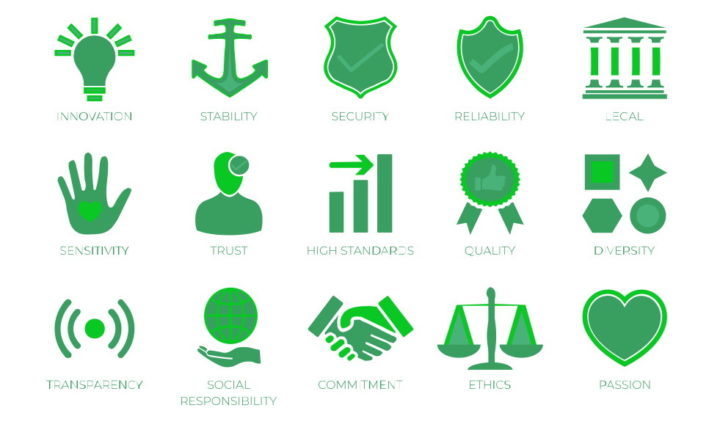The Ultimate Guide to Finding Your Dream Job

So you want to find your dream job. You’ve come to the right place.
If you want to take ACTION and learn the exact steps to getting your dream job, this guide is for you. You’ll learn:
- How to identify exactly what kind of companies you want to work with
- How to impress those companies before they even see your resume
- How to write a cover letter and resume that rise to the top of the hiring manager’s stack
- How to interview like a pro
- How to seal the deal and turn an offer you LIKE into a job you LOVE
If you want to go beyond daydreams and actually get your dream job, this can help. Let’s get started.
IS THIS GUIDE FOR YOU?
This guide is for doers, not dreamers.
There is a ton of advice out there about how to identify your passion. The Myers-Briggs test, strengths finders, “do the grown-up version of what you loved doing as a kid.” None of that’s bad advice, but it’s incomplete.
Once you identify what kind of job you want, how do you get it? Let’s say you take those tests and realize you want to work as a B2B outside salesperson for a small (10-50 employees) company with coworkers who all play volleyball together on weekends, a boss who encourages you to grow but doesn’t micromanage you, and an office near the beach. Oh, and a total compensation package of $92,000 or more.
Great! Now how do you get that job? That’s where most “find your dream job” articles go silent, and traditional advice like, “send out 1,000 resumes” falls short.
Luckily, at CulverCareers we’ve got you covered.
Contents
- Chapter 1:Identify the environment you want to work in
- Chapter 2:Become the candidate your dream company would hire
- Chapter 3:Impressing decision-makers
- Chapter 4:Craft a resume that grabs attention
- Chapter 5:Write an unforgettable cover letter
- Chapter 6:Interviewing
- Chapter 7:Seal the deal (turn a job offer into a position you’ll love)
- Chapter 8:What if you already like your job, but want to love it?
Chapter 1: Identify the Environment You Want to Work In

Why is this important? Because it’s so contrary to the conventional (failed) wisdom.
Most job seekers start by writing a generic resume and cover letter, and then blasting them out to 100 companies. That doesn’t work, because companies can sniff out a generic resume from a mile away. They know these applicants don’t want to work for them…they just want a job.
Here’s what works instead: get hyper-specific about the type of company you want to work for. That way, you can explain to companies that fit your requirements exactly why you want to work for them. That shows passion, intrinsic motivation, and signals to the hiring manager that you’re likely to stick around for awhile.
Here’s how to do that:
Build a wish list of companies you’d like to work for

Start off by thinking of your dream employers. Obviously, write those down, but also expand upon that list. You need to cast a wide, but specific, net when trying to find your dream job. So take a look at the companies you’ve written down and ask yourself what it is about these companies that attracts you. Then research and find other companies that share these same traits.
Another thing you can do to expand your list is research each of the companies you’ve written down and find out who their competitors, vendors, clients, and associates are. Consider adding them to your list. Even though they’re not the first company you thought of, they exist within the same industry and may share some of the traits that attract you as an employee.
Speaking of the industry, do what you can to familiarize yourself with the industry or industries you’re interested in. Read blogs and go to conferences or conventions and continue to add to your list of dream employers.
Get an insider’s sense of the company’s culture

If there’s one thing that leads to job satisfaction and often gets less attention than it deserves during the job-search process, it’s company culture. If you’re going to be spending 8+ hours per day somewhere, your life will be a whole lot better if you’re happy and feel like you fit in. A good fit with company culture is directly linked to employee retention. To put it another way: if you’re happier with your employer’s culture, you’re more likely to stick around.
Culture spans everything from work attire to the level of micromanagement to whether the office has an intense fantasy football rivalry every year. To figure out whether the company’s culture will be right for you, do your research and also take note of everything you notice during the application and interview process.
When it comes to research, look into the company’s leadership. Nine times out of ten, a company’s leaders dictate the vibe of the company. Are they super numbers focused? Do they have a “flat company structure” mentality? Are they all about goofing off and having fun? Read things they’ve written. What they say says a lot about who they are and what they value.
Look into the company’s employees, as well. Read their LinkedIn profiles and see where they came from and how long they stayed with the company, if they’re no longer there. The more you know about the people who make up the company, the more you know about the company itself.
Once you get to the interview stage with a company, take note of the interview questions. If you get an in-person interview, take in the look and feel of the office. It’s easy to get so wrapped up in your own nerves that you don’t even notice anything else, but remember—this may be where you end up working. Does it seem like somewhere you could be happy for the foreseeable future?
Evaluate the company during the hiring process

The entire hiring process, from job posting to job offer, is a great time for you to evaluate a company. You want to work for an employer who values you and whose work style you jive with. Use every step of this process to determine whether this company is right for you.
Some things to consider:
- Does the job posting only list things they expect of the potential employee, or do they also list ways the company will benefit you (i.e. opportunities for growth, flexible work hours)?
- What is the communication like during the hiring process? Does the company value your time and treat you professionally, or is it impossible to get ahold of anyone and when you do, is the communication terse and impersonal?
- If you have to put together projects or presentations as part of the interview process, are they things you enjoy doing? How does the feedback process go? Is this indicative of the type of work environment you need to thrive?
Remember that the company is not just evaluating you—you are also evaluating them! You don’t just need a job for now, you need one that you will want to stick with for the long haul.
Chapter 2: Become The Candidate Your Dream Company Would Want To Hire

Now that you’ve figured out what kind of company you want to work for, and what type of position you want, it’s time to build yourself into the candidate the hiring manager would dream of meeting.
How? Start building your skills. If you’re a B2C salesperson and you want to move into B2B sales, then take a class on B2B sales. If you’re a social media expert but you want to start running ads on Google, earn some Google Ads certifications.
What would the hiring manager love to see on your resume? Another industry certification? A course on how to sell in that company’s industry? Something else? Whatever it is, go out and get it.
This shows your prospective hiring manager that you’re committed and internally motivated. It also shows that you’re putting yourself in her shoes and trying to make her job easy by giving her the perfect candidate.
Find Out What Certifications Your Future Coworkers Have

Sometimes certain certifications aren’t technically required for a certain position, but you will be expected to obtain them once hired. Find out what certifications your future coworkers have, then go out and obtain them now. This will make you stand out to recruiters and managers as a go getter. It makes you doubly attractive because they won’t have to wait for you to become certified before beginning certain assignments.
Look at the LinkedIn profiles of leaders and employees at the company and see what other continuing education they have completed. This will tell you what classes and certifications actually matter in your industry, so that you don’t just have to blindly Google and hope you’re doing things that are worthwhile.
Consider Obtaining a Degree or Certification in Your Field

While there are many areas you can explore without actually going back to college or attending a certification program, sometimes going back to school is worth it. These days, many people have huge success going back to school and learning in-demand skills in technology, such as coding.
If you are looking at an industry that has a lot of industry-specific information, such as the medical field, some coursework or a certification in that area will do a lot to boost your earning potential and attractiveness to recruiters. Take the time to put yourself in the absolute best possible position for entering your dream industry.
Of course, you might not have time to go back and get a second degree or certification. Consider whether the industry you are looking at has potential for growth from within. Many employers will sponsor education within your field, so you may be able to gain a higher-level position in a more roundabout way, by first entering a position you’re currently qualified for and working your way up the ladder.
If you’re looking for more opportunities to learn new skills and impress a hiring manager, try these sites:
Chapter 3: Impressing Decision-Makers

Sure, you could just send your resume and cover letter out and hope…but you’d be missing a huge opportunity.
How much more successful could you be if you reached out to key decision makers personally and asked them a few questions? If you’re a salesperson looking for a position, reach out to the company’s sales recruiter. You’d show your passion for working for the company, and stay top-of-mind with hiring managers. You’d be doing something very few other candidates will do, which is a great way to stand out.
Here’s exactly how to do that:
Find Ways to Make Connecting Organic

Actually getting in contact with the decision makers at your dream job can seem tricky. But all it takes is a little bit of internet detective work to connect with them in ways that are more organic than just sending a cold message.
Find their accounts on LinkedIn, Twitter, and other social media. Determine whether you have mutual connections on LinkedIn. If so, see whether that person would be willing to make an introduction. Join groups on LinkedIn that they are part of to create common ground. Figure out what their interests are and see whether you have things in common. All of this gives you a strong background for when you finally do reach out.
If you want to send a message to someone on LinkedIn who you are not connected to and isn’t part of any of the same groups as you, you’ll need to upgrade to a paid account. This can be worthwhile if you’re hitting your job search hard, as it makes getting in touch with people much easier. That said, don’t abuse the ability to message people—only message if you have a specific ask or something of interest to them to discuss.
Develop Your Elevator Pitch

When you finally reach out to the hiring manager or key player at your dream job, you need to have a short and sweet pitch that grabs their attention. Known as an “elevator pitch,” this is a quick paragraph that lets them know a few things about you and, most importantly, how you can help them.
You should develop this pitch by condensing a lot of important information about your past accomplishments and future goals into a couple of sentences. To really get an idea of everything you’ve accomplished, make a list of your ten biggest past accomplishments and then boil those down to their essence. Know what you have to offer and how you can quickly cite things you’ve done to give legs to your argument.
The most important part of this pitch, though, is phrasing it so employers know how you can help them. Do you have a strong regional sales background? Let them know that you would be excited to help them expand their sales presence into the Southwestern United States. Are you a social media guru? Tell them that what you’ve noticed about their online presence and how you could make it better.
Request Informational Interviews

One of the best ways to get face time with an important person at your dream company is by requesting an informational interview. This might seem daunting, but if you know how to ask, you can make a meaningful connection at the company and learn valuable things about the industry.
There are a couple of important things to remember when requesting an informational interview.
Firstly, this is NOT about getting a job. You are approaching a leader at this company to learn more about the industry or their company or their career path — NOT to find a job. Of course, your end goal is to land your dream job at their company, but that’s not the focus here. So have something you want to learn and ask for their help learning it.
Secondly, respect that this is an interruption to their work week. Ask nicely and be very flexible, but also make a specific request so that you’re making it easy for them. For instance, suggest meeting for a 15-20 minute coffee somewhere near their office whenever it works for them next week. Leaders in companies often like helping people looking to make headway in their career in the industry, but you have to do most of the work to make the meeting happen and make it as unobtrusive as possible.
Chapter 4: Craft a Resume That Grabs Attention

The average corporate job posting receives 250 resumes. The average hiring manager spends just 6 seconds reading your resume.
What does that mean? Unless your resume stands out instantly, you’ll be lost in the shuffle.
So how do you make your resume stand out? If your resume is #127 out of 250 the hiring manager reads that day, how do you make her say, “I really liked that guy’s resume…let’s get him in for an interview!”?
Don’t sweat it. We’ll show you how:
Focus On What Matters

Given how little time your resume has to impress a hiring manager, the content of your resume has to stand out. Everyone who submits a resume will have a list of jobs and experience. Don’t let your resume be another dry list of unassociated facts without anything to tie them together.
Use the top part of your resume to tell a story, rather than a list of highlights. Don’t say, “I’ve built 5 websites for eCommerce companies, I know some conversion rate optimization, and I have a minor in Psychology.” Don’t just list those facts. That’s forgettable. Instead, you could say, “I use my understanding of user psychology to design and build eCommerce websites that convert.” That’s memorable. And if you’re applying to an eCommerce company, that’s very appealing.
As Ramit Sethi says, “Ask yourself, “After someone reads my resume for 10 seconds, what is the one thing they should remember about me?”
Choose an Appropriate Format

Beyond putting your story at the top, how you format the rest of your resume is also important. Many people assume that chronological is the only way to go, but that’s simply not the case. You can also organize your resume by function, and we’ll explain the difference between the two and why you would use each.
Chronological resumes are what most candidates are used to. They are ideal if your career path has been pretty standard: you’ve been progressing in responsibility, title, and salary in the industry you’re planning on staying in. This is great in this case because your most impressive and relevant work is closest to the top, and if the hiring manager wants to see how you’ve built to this point, she simply follows the resume to the end. Pretty simple.
But if you’re changing industries or careers, a functional layout might better suit you. For instance, let’s say you want to go into advertising, but your past jobs were in sales. What you will want to do is highlight a few main skills or traits that you have as a result of your sales jobs and group your resume into sections with those titles. For instance, you might title one section “Communication” and list the jobs you’ve had where you have done things in that area, and bullet point those specific responsibilities or accomplishments.
Hire a Resume Writer

This might not be necessary for everyone. If you’re finding that you get interviews at the majority of companies you apply for, your resume might be awesome. If that is the case, unless you’re looking to change fields and need a major overhaul, you’re probably good on the resume front.
But most people could use the expertise of a resume writer. These writers understand that a resume isn’t just a biography—it’s a marketing tool. And they know how to use it for that purpose.
It’s too easy to be precious with our own job histories and accomplishments. If you find that your resume is unfocused or lists way too much, you could definitely benefit from having a professional whittle it down to its essence.
Chapter 5: Write An Unforgettable Cover Letter

A resume without a cover letter isn’t going to stand out. A cover letter adds context and gives you a chance to show the company you’re applying to exactly why they’d be crazy not to hire you.
But a mediocre or cut-and-paste cover letter is worse than nothing. You need to grab the hiring manager’s attention and show him what you can do for his company, using stories and specific examples to seal the deal and earn an interview.
Here’s how to make your cover letter shine:
Customize The Entire Cover Letter

We know—it sounds exhausting to write a thoughtful, customized cover letter for every job you apply for. But if you want to stand out, that’s exactly what you have to do.
Do your research and find out to whom the cover letter should be addressed. This is the first step to showing that you actually care about this job and are willing to put in the extra effort to get everything right. If you know anyone at the company who is willing to refer you, include their name in the first paragraph.
Beyond this, use your cover letter to explain how your experience and expertise will benefit this company. Be specific. Tell a story about how you got your last company out of a tough predicament or cut marketing costs by 25%. Let them know how your past experiences have made you into the employee you are today and what that means for them.
Keep It Concise

We’ve just told you everything you should fit into your cover letter, but there’s one big caveat here—and this is important. Do it succinctly. Decide what you want to say it and say it in as few words as possible. Keep any extra fluff out and only include the heart of your message.
If you have a lot of qualities that match things the hiring manager is looking for and you want to detail all of them, go with a bullet point format to keep it readable. Matching what you have with what they need is important, but the moment it turns from a cover letter into an autobiography is the moment their eyes glaze over and you’re done for.
The cover letter is a great example of something that can use multiple revisions. Each time you revise, it should become simpler and cleaner. Introduce yourself while explaining your past experience. Quickly list some accomplishments in a bullet pointed list. Finish with a note about how you will follow up. Then be done. It may seem too short and simple, but trust us—your dream employer will appreciate it!
Consider Your Formatting Choices

This goes along with keeping things concise. Cover letters have to appear quick and easy to read or they won’t be read. Your hiring manager is busy and has hundreds of cover letters and resumes to get through. Make this as easy for her as possible, while still conveying what you need to convey.
Make use of white space. If your cover letter is “just” one page, but the page is filled to the brim with tiny font and small margins, no one is going to want to read it. Use bullet points and short paragraphs to make sure your cover letter actually gets read.
Chapter 6: Interviewing

A great resume and cover letter can get your foot in the door, but that’s it. They can’t get you a job; they can only get you an interview.
Once you’re sitting across from the interviewer, it’s your job to use that conversation to accomplish two things: 1) Convince her she needs to hire you instead of the other 5-10 people she’s interviewing, and 2) Identify whether or not this is a company you could truly see yourself at.
Does that sound like a lot for one meeting? Don’t sweat it. We’ll break down how to nail both parts of the interview.
Prepare, Prepare, Prepare

It should go without saying at this point, given the amount of preparation you’ve put into each step of your job search and application—but in case it hasn’t come across fully, PREPARATION is everything.
The research that you’ve already done will help you out, but now that you’ve lined up an interview, it’s time to really delve deep into this company. Read every word on their website and pay particular attention to their mission statement. Knowing their core values is very important so that you understand what they’re looking for in an employee (and make sure that those values align with yours). Read recent blog posts. See what matters to them that’s happening in the industry right now and be prepared to talk about it.
While you’re researching the company, if you haven’t already, look at anything they post on social media or their website that lets you know about their company culture. Not only is this important to help you decide whether or not this job is right for you, but it’s another level on which you can connect with your interviewer.
Also, don’t forget to prepare for potential interview questions with stories that will make you stand out. The more stories and accomplishments you can put together that draw a great picture of who you are and what you’re capable of, the better.
Remember They Want You to Succeed

On your side of the table, it’s easy to forget that the interviewer wants this to go well (almost) as much as you do! They are looking for the best possible candidate to fill that position, and they don’t want to waste their time on multiple rounds of interviews with people who don’t fit the bill.
Enter the room with a warm confidence. Know that you are great and have a lot to bring to the table! You have the skills, you’ve done the research, and you’re in this room for a reason. Your interviewer isn’t looking for things to pick apart—they’re hoping that you’ll be great in this position. Keeping this in mind can really help to shake those interview nerves.
Ask Your Questions

When the hiring manager finishes asking you questions, it’s your turn. Sometimes at this point, people freeze up. Or they ask generic questions that don’t show the interviewer that they’re serious about the company and the position.
Don’t go crazy interrogating your interviewer to the point where they feel uncomfortable, but definitely bring a list of questions. These questions should range from more in-depth questions about the company itself and its trajectory to questions about your position within the company.
Don’t forget that you’re looking for your dream job here! Do you have burning questions in the back of your mind that you’re afraid to ask? Work through those beforehand and find a way to ask them. You don’t want to accept a job offer only to find out that something really important to you is missing from the position. Ask all of your questions and engage in conversation about the answers.
Chapter 7: Seal The Deal (Turn A Job Offer You Like Into A Position You’ll Love)

The time after you’ve received a job offer is like the last mile of a marathon. Lots of runners lose in the last mile, and lots of candidates take the job but leave tons of value on the table. Vacation days. Signing bonuses. Extra perks like work-from-home Fridays.
But you won’t. Now that your dream company wants you, you’ll negotiate with them to turn a good job offer into a dream position.
We’ll show you how.
Don’t Just Negotiate Salary

Of course, salary matters! And we’ll get to that. But don’t lose sight of the bigger picture. Not every company is going to be the top-paying firm in its industry. If it’s your dream job with your dream company and the salary ends up a little lower than you’d like, use that to negotiate in other areas.
When you’re looking at a full compensation package, always remember that there is more than just salary in the mix. You’re looking at health (and many other) benefits, your schedule, tuition reimbursement, continuing professional education, your job title, work from home days and PTO, amenities such as a company car, laptop, and phone, and potential bonuses. So take all of this into consideration when negotiating. Jobs that can’t necessarily pay more can often pull strings in other areas to make your job or work/life balance better for you.
If work schedule flexibility matters to you, make it a point to bring this up during negotiations. Working from home, flexible working hours, and additional vacation time are three things you can discuss with your new employer.
Consider what matters most to you and negotiate around those things.
Salary Does Matter, Though

We’re not saying not to negotiate salary, though! It’s just important to remember all of the puzzle pieces that go into creating your dream job and your dream work/life balance.
When you’re looking at negotiating salary, the most important thing is to do your research. (Do we sound like a broken record? Research is key!) Talk to friends in the same industry or your recruiter if you worked with one. Get on Glassdoor and see what you can find out.
Figure out what you have to offer that is better than the average applicant, and be prepared to discuss your value when it comes to the company’s bottom line. This is easier for some jobs than others. But knowing the average salary for the position within the industry and having a strong argument for the salary you think you should have goes a long way.
Remain Likeable

Don’t forget that these are the people who want to give you a job! Maintain the same warm, professional demeanor you had throughout the entire interview process. Don’t let negotiations turn you into a cold, hard, number-crunching machine. That job offer can still be rescinded, so you need to keep your cool and not let the stress of negotiations affect your likeability.
Bonus Chapter: What If You Already Like Your Job (But Want To Love It)?

What if you already like your job, and you don’t want to leave your current company?
That’s fine, and congratulations on finding a good job! But a job shouldn’t just be good enough, it should be something you’re excited to go into every day.
Are there parts of your job that frustrate you, even if the overall experience is good? A manager who wastes time with long meetings, or a salary that’s a few thousand below what your peers are making?
We’ll show you how to fix those issues and transform your job from good enough into dream job.
Talk to Your Boss

Talking to your boss about issues you’re having at work is easier said than done. The thing to remember, though, is that if you’re not happy for some reason, it’s your job to fix it. No one else is going to do it for you and you’re the one who has to spend 8+ hours/day dealing with whatever issue it is that’s bothering you.
The first step to whatever you’re looking to change is figuring out exactly what the conversation is that you need to have. The second step is planning for that conversation, and the third is having it. Roleplay with a friend if you are nervous about how discussing an issue will go. Managers are just people at the end of the day, and hopefully yours will be glad to have a conversation that will make it more likely she can retain a great employee!
Create a Career Plan

One specific instance in which your boss or another mentor at the company can help a lot is in planning your career. Believe it or not, not everyone at your company is super career-focused. Lots of people are content to stay in their current position essentially forever, so it’s your job to let your boss know that you’re not one of those people.
Ask to discuss your career trajectory. Go into the conversation with some ideas about where you’d like to see your career go and why. Have a few ideas about near-term things you could do (taking a course, getting a certification, leading a project) to take a step towards that goal. Don’t let the conversation be generic—make an action-oriented plan, and ask for quarterly or monthly check-in appointments to discuss your progress.
If you have this discussion and it becomes apparent that there is no upward trajectory that you can take at your firm, then at least you know that. That likely means that it’s time to start making an exit plan, but it’s better to know than not to know.
Negotiate Salary

Salary negotiations vary widely depending on the industry, the size of the company, and the nature of your position. Some companies simply don’t have any room in the budget (or close to none), while some could pay you triple your salary if you could prove you deserved it. Take your company’s structure and industry into mind when planning to ask for a raise.
A lot of companies will not give raises outside of certain time periods (often around the annual performance review). It does not hurt to have the discussion outside of that window, as it lets your manager know you’re serious about doing more for the company and being compensated for it, and he’ll have that in mind come budget time. But just know that if you can’t squeeze any extra income out of your company at this exact moment, it might be because it’s simply not a feasible thing for your manager to do.
That said, don’t be afraid to ask for a raise! You’re going to have to prove yourself to get more, but that doesn’t mean it’s impossible.
You should begin your research for a raise the same way you would begin a salary negotiation. Research the salaries of comparable positions within your industry. See if you can find out what coworkers make (though don’t directly bring this up, as you don’t want to throw anyone under the bus).
Next, do what you can’t do in an initial salary negotiation: figure out what you’ve already done that’s been financially good for the company! You’re expected to do your job—what have you done that’s gone above and beyond? Anything that you can directly tie to finances is best, but if you work in a position separate from the financial side of the company, still come in with a list of ways you’ve exceeded expectations. Companies pay for performance! Show them what you’re made of.
Ready to build a winning team?
When you’re looking for executive strategic partners to help build your team, you couldn’t ask for a better partner than CulverCareers.
Start Hiring